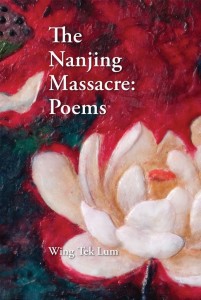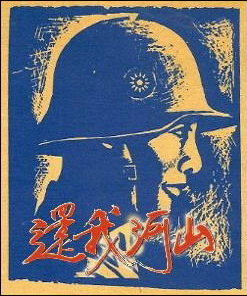War Poems
- By Peter Harmsen
- 28 April, 2014
- No Comments
 To express the essence of the 1937 Nanjing Massacre in 104 poems—that is the mission which Honolulu businessman and writer Wing Tek Lum embarks upon in a recent collection of poetry. He succeeds marvellously. The Nanjing Massacre: Poems, published by Bamboo Ridge Press (www.bambooridge.com), succinctly portrays the battles that led to the fall of Nanjing as well as the ensuing carnage as the victorious Japanese army pillaged and raped its way through the city.
To express the essence of the 1937 Nanjing Massacre in 104 poems—that is the mission which Honolulu businessman and writer Wing Tek Lum embarks upon in a recent collection of poetry. He succeeds marvellously. The Nanjing Massacre: Poems, published by Bamboo Ridge Press (www.bambooridge.com), succinctly portrays the battles that led to the fall of Nanjing as well as the ensuing carnage as the victorious Japanese army pillaged and raped its way through the city.
Using a variety of perspectives, Lum delves into the personalities of the people who took part in the immense tragedy of Nanjing, victims and perpetrators alike. Some of his poems are lengthy and full of action, brimming with sights and sounds, leaving much the same impression as much wordier short stories would. Others are vignettes in the terse, stripped-down style of Haiku poetry, albeit with often gruesom subjects, such as this:
ON THE ROAD
a body flat on the road
crushed by passing tanks
face in bas relief
“My collection of poems is essentially fiction, although I did a lot a research, from diaries, photographs, testimonies, interviews, general history books,” says Lum. “So I am presenting literary truth, not historical truth.”
Craig Howes, director of the Center for Biographic Research at the University of Hawaii Manoa, compares Lum’s art with that of Francisco Goya, whose prints in Disasters of War set a horrifying memorial for the Napoleonic Wars.
“At key moments, he also broadens the frame of reference, linking the crimes in China to the atrocities committed since then at different times, on different continents. Massacres, Lum suggests, bear a family resemblance–the human family,” Howes writes in an introduction to the poems.
“But The Nanjing Massacre is much more than a chamber of horrors. Lum’s spare and meticulous verse offers up vivid, memorable, and even beautiful images, and many of the poems are mini-narratives, suspenseful and compelling.”
Below a sample of Lum’s poems, described by Chinese writer Ha Jin as providing “both kaleidoscopic slices and a vast panorama of the tragedy.”
THE NIGHT BEFORE
Our commander assembled our company.
He told us that at dawn
we would lead the charge
to breach the wall. We were to carry
as much ammunition as possible
but only one day’s rations.
The next night the food inside the city
would be ours for the taking.
We would without question be victorious.
We would fight bravely,
we would fight fiercely,
but some of us would fall.
We clipped our hair and fingernails
to send back to our families
if our bodies were not recoverd.
We spokles of home. Some of us
wrote letters, fingered temple beads
and tucked away our good luck charms.
We cleaned our rifles once again.
We sang songs about cherry blossoms
falling from the branch, petals
scattered in the wind,
their fragrance lingering on forever.
Voices wavered, with lumps in our throats,
eyes misty. But we cheered together.
We shared sake. Toasting our company,
our commander, our emperor and country.
The last of us threw down our cups,
porcelain shattering on the ground.
I HOLD MY BREATH
We hit them hard. So many are cut down
by our initial charge. The few left standing
flee and we give chase, full throttle
through the field of newly dead and wounded.
There is no time to go around.
I keep driving straight, noting every soft impact.
Our tank sways gently, losing traction
upon this uncertain ground, a small boat
plowing through the waves. I hold
my breath; in my heart I pray for mercy.
HAIKU
AFTER THE FIREFIGHT
surrounding snow keeps melting
our light machine gun
has not yet cooled down
BLOOD
splattered on my shirt
this blood must be another’s
—I am still alive
TAKING OFF MY BOOTS
I dry off my swollen feet
—overgrown toenails
now need to be pared
COOKING RICE
We use their helmets
But mine keeps leaking water
—a clean bullet hole!
STRETCHER BEARERS
We had made it halfway down the hill
before we noticed
that the buddy we were lugging
was no longer breathing.
We still wanted to bring his body back
so he could return home.
But many more up there
had been hit.
We decided to roll him off
by a shattered tree
and make our way to the summit
to find another of our wounded.
It hurt—but then again
maybe it did not matter
to this guy any more.
He had crosses over to another world.
It was for us
to help others persevere in ours.
IN A DESERTED CAMP
We are so hungry
that when we come across
a hidden crate of canned meat
we lose all discipline
and climb over each other
to grab what we can.
We do not notice
the airplane overhead
until it starts strafing us.
Everyone dives for cover.
And when my buddy gets hit
instead of attending
to his wounds
I just scramble for his tins.
THE NEAR DEAD
They lie cast about
as if by a sudden whirlwind,
some faces pressed into the ground,
some staring up at the sky,
some without faces anymore.
There are bodies
that are contorted, arched
or curled up and inert
like a pond snail pried from its shell,
some with arms or legs splayed
or with arms or legs
broken, blown off, crushed.
Blood pools from under the bodies,
bubbles up, oozes into rust,
is splattered on their uniforms,
their life breaths hushed, swirling,
hovering above, sucked within,
butterflies too stunned to fly home.
Our sergeant, a compassionate man,
picks his way through the corpses
clutching a torch and his beads,
pointing to this one or that,
the few still writhing
or uttering a sow moan,
the glint of an eye now raw and weary,
a rabbit of dread,
and we follow, bayonets poised
then thrusting quickly,
aiming true, into their hearts,
rending souls,
these still wavering,
these rice birds darting in and out.




 Copyright © 2024
Copyright © 2024
Leave a Reply